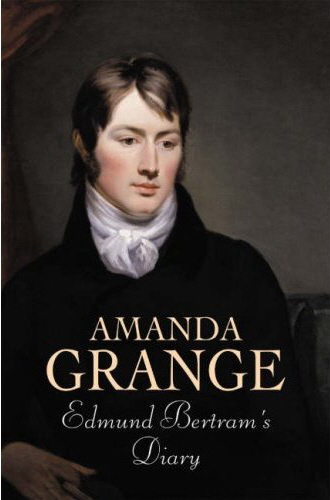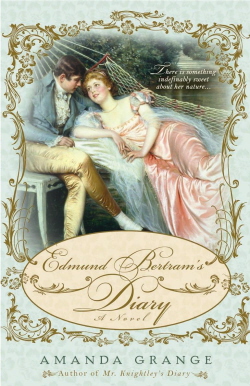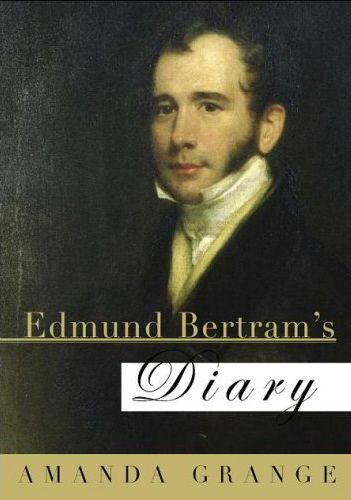Edmund Bertram's Diary
A retelling of Mansfield Park



Synopsis
Edmund Bertram's well ordered life at Mansfield Park is turned upside down by the arrival of the bewitching Miss Crawford. She brings the excitement of the fashionable world to the countryside, quickly captivating him with her beauty and her wit. But she is not all she seems to be, and if Edmund is to find the happiness he deserves he will need the help of all his friends, not least the gentle Fanny Price.
REVIEWS
"Once again, Amanda Grange has provided a highly entertaining retelling of a classic Jane Austen novel, as seen through the hero's eyes. EDMUND BERTRAM'S DIARY is pure fun, with the story told in a diary format that makes the reader feel like she's taking a peek into Edmund's most innermost thoughts. . . I enjoyed every moment of it." - Kay James , Romance Reader at Heart
"Edmund Bertramís Diary is a sympathetic portrait of a young man struggling with the difficult choices that life throws at us all." - Austenblog
"Amanda Grange has hit upon a winning formula and retells the familiar story with great verve." - Historical Novels Review Extracts This extract is taken from about half way through the book. Edmund has met and become enamoured of Mary Crawford, but Mary's desire for wealth and bustle alienates Edmund. Here he is at a ball, just before he leaves the neighbourhood, after which he visits his friend Owen so that they can be ordained together. And, as Mary knows, Owen has three pretty sisters . . . 'If I could only make you see that the life you want for me would not bring me happiness,' I said. 'The noise you speak of, the bustle and importance, are only necessary because they hide an emptiness at their heart.' 'William Price does not appear to think so.' 'William's case is different. He is in the navy, and we depend on the navy for our freedom.' 'And do we not depend on our politicians for our freedom, too?' 'But I have no taste for politics,' I said, 'and if I did, it would have no taste for me. A younger son belongs nowhere in such an arena. This is where I belong, in the neighbourhood where my family have always lived. I am a part of it, and it is a part of me. In the parish I have a chance of making a difference; in London I can do nothing except make myself miserable.' 'You are determined to squander your talents,' she said, annoyed. 'I thought that you, of all people, would pay attention to the parables.' I shook my head at her notion that I was hiding my light under a bushel. 'My light would soon be extinguished in London,' I said. 'And so would yours. Think again about going there.' 'So now you want me to forego my own pleasures because they do not match your own?' she demanded. 'I would by no means rob you of any pleasure,' I said stiffly. 'But there is a price to be paid for everything, and I hope you may not find that the price you pay for the life you desire is too high.' We relapsed into silence, whilst all around us my father's guests danced. We continued down the set, but my thoughts were not on the steps, they were on Mary and her unquenchable desire for wealth and renown. The dance ended, and we parted with vexation on both sides. Mixed in with my anger was the dismal knowledge that she would never consent to marry a country parson; and that I could never be happy being anything else. I wandered here and there amongst the dancers, offering my hand to the ladies who were sitting out, talking to the chaperons and making everyone feel welcome, for I could not let my personal feelings interfere with my duty. But all the time I was thinking of Mary, and feeling the loss of her like a physical pain. At last it was time for me to claim Fanny, and I found her with relief. 'I am worn out with civility,' I confessed, as I led her on to the floor. 'I have been talking incessantly all night, and with nothing to say. But with you, Fanny, there may be peace. You will not want to be talked to. Let us have the luxury of silence.' She smiled in silent sympathy, and I found it a great solace to be able to dance with her. How different was our silence to the one that had fallen between Miss Crawford and myself, for that had been angry and not at all comfortable. But then, Fanny is one of my oldest friends, and it would be a strange day, indeed, if I should ever find myself at outs with her. Friday 23 December I arose in bad spirits, and glad to be going away. No good could come of my seeing Miss Crawford again, for all hope of a marriage between us had gone, and my absence, followed by her own, was the best thing for both of us. I went down to breakfast and found Crawford just arriving. He ate with us, for his sister was fagged after the ball and had not wanted to get up so soon. Crawford and William were cheerful, but I could think of nothing to say, and so I sat silently. Fanny, too was silent. She watched William avidly as he ate his pork chop and mustard, refusing to take her eyes from him even for a moment, so unwilling was she to lose one precious moment of his company. At last William pushed back his chair, and Crawford did likewise, then William embraced his sister robustly. But although he was sorry to leave her, it was clear he was equally eager to be gone, for he knew that on the next forty-eight hours his whole future depended. There was all the usual bustle of departure and then the carriage pulled away. Fanny would not relinquish her post at the door until it had turned the corner and gone from sight. 'Come in Fanny, before you catch cold,' I said to her. She allowed me to take her inside, and I plied her with eggs and tea, which she cried over very prettily. But she ate all the same, for much as she missed William, she was hungry, and besides, she wanted to please me. After she had eaten, I suggested we go out for a walk, and the beauty of the morning revived her. Once indoors again, I made her join me for a second breakfast, where I persuaded her to eat a little seed cake, and then I bade her and the rest of my family goodbye for a week, mounted my horse and set off for Peterborough. Once on my way, I was free, at last, to think of my own business. The day was fine, though cold. Frost coated the bare branches, and covered the last blooms of summer that remained in sheltered hollows or in the lea of walls. I wanted Fanny with me when I saw a red rose still blooming, one hardy flower keeping its place amongst the thorns, for I was persuaded she would have liked to see the Hoary-headed frosts Fall in the fresh lap of the crimson rose. I reached Lessingby and was glad to find myself going up the road to Owen's house before darkness fell, though the daylight was already fading, dwindling into a soft twilight brightened by the translucent frost. A light shone in the window. Then the curtain was pulled back, and the candlelight flooded out in all its splendour, staining the drive gold with its brilliance. The curtain fell; I was at the door; my horse was taken, and then I was being welcomed into the house by Owen and his family. It was bright inside, so bright that I had to blink, and the heat flowed over me and wrapped itself round me like a blanket. 'Welcome,' said Owen's mother, an elegant woman who nevertheless possessed a homely air. 'You must be cold. Here, sit by the fire. Beddows, a glass of wine.' And before long, I found myself seated by the fire with a wine glass in my hand, surrounded by Owen's family. His sisters were elegant and pretty, and were sitting over their needlework; which, however, they neglected to listen to the conversation. After the details of my journey had been thoroughly dealt with, and enquiries had been made as to my family's health, Owen and I began to talk of our forthcoming ordination. It was a relief to be able to talk about it in sympathetic company, knowing the subject would not prompt ridicule or frustration; for with Owen's father being a clergyman himself, and Owen to be ordained with me, it was a house of clergymen. We continued our conversation over dinner, and the three Miss Owens added their thoughts. Everyone was very pleasant, and the meal was excellent, and I found myself looking forward to the coming week. Over the port, we discussed the subject more thoroughly and then went through to the drawing-room, where the Misses Owen entertained us with singing and playing on the pianoforte. I thought of Thomson: An elegant sufficiency, content, Retirement, rural quiet, friendship, books. And thought of the Miss Owens, and how different they were from Mary Crawford. Thursday 29 December This has been perhaps the happiest week of my life. To have finally fulfilled my destiny and become ordained has left me feeling at peace with the world. 'We are so proud of you both,' said Mrs Owen this evening over dinner. 'You are both fine additions to the clergy.' 'Yes, indeed,' said Mr Owen. 'The church needs young people like you, forward thinking young men with ideas and energy. Men who will lead by setting a good example to their parishioners, and who will restore the clergy to its proper respectability. There has been too much easy living of late; too much ignoring of parish duties; too many clergymen inclined to take their ease and let others do the work. They do not seem to realise that it is in the work of the church that its future lies. You young men have a chance to make a difference, to enhance your parishioners' lives with your judgement, example and understanding, and set the tone of the country for generations to come.' 'Yes, indeed,' said Mrs Owen. 'I only hope my brother might soon have a living. You have one, I understand, Mr Bertram,' said Miss Owen, a pretty girl with eyes as blue as the porcelain jug. 'I have, at Thornton Lacey,' I told her. 'Thornton Lacey! What a coincidence. We passed through there on our way to Aunt Hester's in October. I remember it well. The rectory was a gentleman's residence, and the parish was a good size. Do you mean to live there?' she asked me. 'Yes, I do. I can see no point in going into my parish only to read the sermons.' 'Good, good,' said Mr Owen approvingly. 'And is the house well situated?' asked Mrs Owen. 'Oh, yes,' said Miss Owen, before I could answer. 'To be sure, the farm could perhaps be moved, but the situation is admirable. The house is very fine, quite the finest house in the neighbourhood, and the view is very pretty. There is a dear little garden, with meadows beyond, and a stream - quite delightful.' I found myself wishing that Mary could have been as well pleased with it, but Mary was of a different kind to Miss Owen. I remembered her insulting words at the ball: A clergyman is nothing . . . can do nothing . . . be no one . . easily satisfied . . . no ambition . . . a real man makes his mark in the world . . . . I was so busy thinking of her that I did not realise Mr Owen was speaking to me. I brought my thoughts back from their own paths in time to hear Mr Owen say, 'You have been fortunate.' 'Indeed I have.' 'And how are your friends the Crawfords?' asked Owen, as the conversation moved away from the church. 'The Crawfords are the brother and sister of Dr Grant,' he explained to his family. 'Mr Crawford has an estate in Norfolk, and Miss Crawford is an heiress. A beautiful and intelligent young woman by all accounts. Are they still at Mansfield?' 'For the present, but they will not be there when I return. Miss Crawford is going to stay in London for an extended visit.' 'She will be staying with her uncle?' asked Owen. 'No, with her friend, a Mrs Fraser.' There was a short pause, then Mrs Owen said, 'It seems a shame that you should have to hurry back to Mansfield tomorrow, Mr Bertram, we have seen so very little of you. Will you not do us the very great favour of staying another week?' I thought of Mansfield and I knew that Mary would not yet have left, so that if I returned as planned I would be forced into company with her. I found I did not want to see her again. What use would it be for me to torment myself with the sight of her, when I knew she would never marry me? For she would not be satisfied until she had a house in town and a husband who was universally acclaimed. And then I thought of Owen's house, with his welcoming family and his pretty sisters, and I said, 'You are very kind. I would like to stay above all things.'
